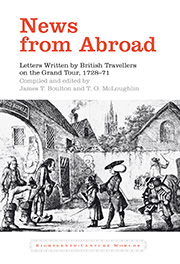Book contents
- Frontmatter
- Contents
- Preface
- Illustrations
- Acknowledgements
- ‘Old Style’ and ‘New Style’ Dating
- Map
- Introduction: The Grand Tour
- The Tourists and Their Letters
- George Lyttelton (1709–73): Letters (1728–30)
- Joseph Spence (1699–1768): Letters (1730–3)
- James Boswell (1740–95): Letters (1764–6)
- James Barry (1741–1806): Letters (1765–71)
- Caroline Lennox (1723–74): Letters (1766–7)
- Appendix A The Hazards of Collecting Art on the Grand Tour
- Appendix B Advice to Travellers on the Grand Tour
- Bibliography
- Index
The Tourists and Their Letters
- Frontmatter
- Contents
- Preface
- Illustrations
- Acknowledgements
- ‘Old Style’ and ‘New Style’ Dating
- Map
- Introduction: The Grand Tour
- The Tourists and Their Letters
- George Lyttelton (1709–73): Letters (1728–30)
- Joseph Spence (1699–1768): Letters (1730–3)
- James Boswell (1740–95): Letters (1764–6)
- James Barry (1741–1806): Letters (1765–71)
- Caroline Lennox (1723–74): Letters (1766–7)
- Appendix A The Hazards of Collecting Art on the Grand Tour
- Appendix B Advice to Travellers on the Grand Tour
- Bibliography
- Index
Summary
OVERVIEW
AN EIGHTEENTH-CENTURY guidebook for travellers on the Grand Tour. starts with the remarks:
Travelling, even in the remotest ages, was reckoned so useful a custom, as to be judged the only means of improving the understanding, and of acquiring a high degree of reputation… The first civilized nations had so exalted an idea of those who had been in foreign countries, that they honoured even such as made but short voyages, with the title of philosophers and conquerors.
If the spirit of the Grand Tour could thus be traced back to the ancient Greeks, the concept and the term itself were relatively new. Its first use is often attributed to Richard Lassels (c.1603–68), a Catholic priest, who made the trip on several occasions as tutor to the sons of nobility; he died in Montpellier in France ‘on what would heave been his sixth voyage to Italy’. Among many other seventeenth-century travellers were Thomas Coryat (c.1577–1617), author of Coryats Crudities (1611), the architect Inigo Jones (1573–1652), Thomas Hobbes (1588–1679), who went as tutor to the future Earl of Devonshire in 1614–15, and John Milton in 1638–9. William Bromley (1664–1732) added to a growing fashion by publishing an account of his journey, Remarks in the Grand Tour of France and Italy. Perform'd by a Person of Quality, in the Year, 1691, claiming with becoming modesty that ‘when this Journal was writ, he had no Intentions of making it publick, and now is above the proposing to himself an Advantage thereby’.
- Type
- Chapter
- Information
- News from AbroadLetters Written by British Travellers on the Grand Tour, 1728–71, pp. 4 - 22Publisher: Liverpool University PressPrint publication year: 2012



